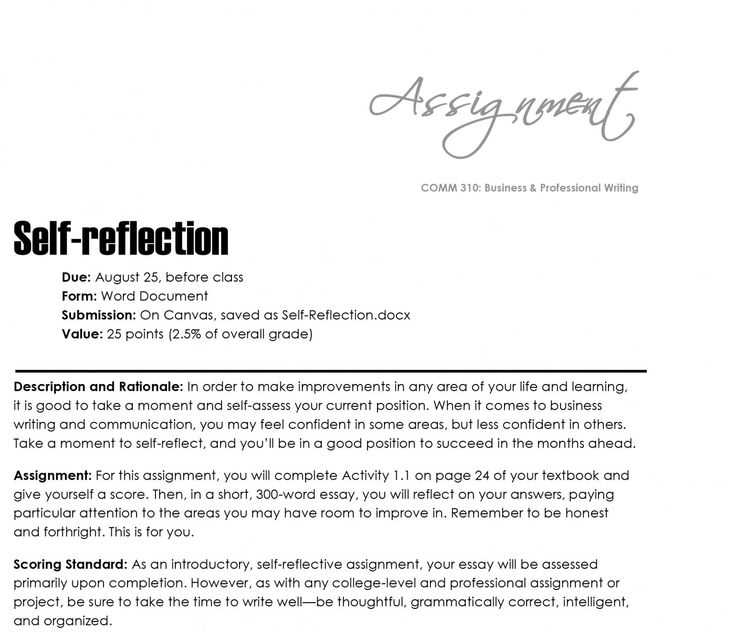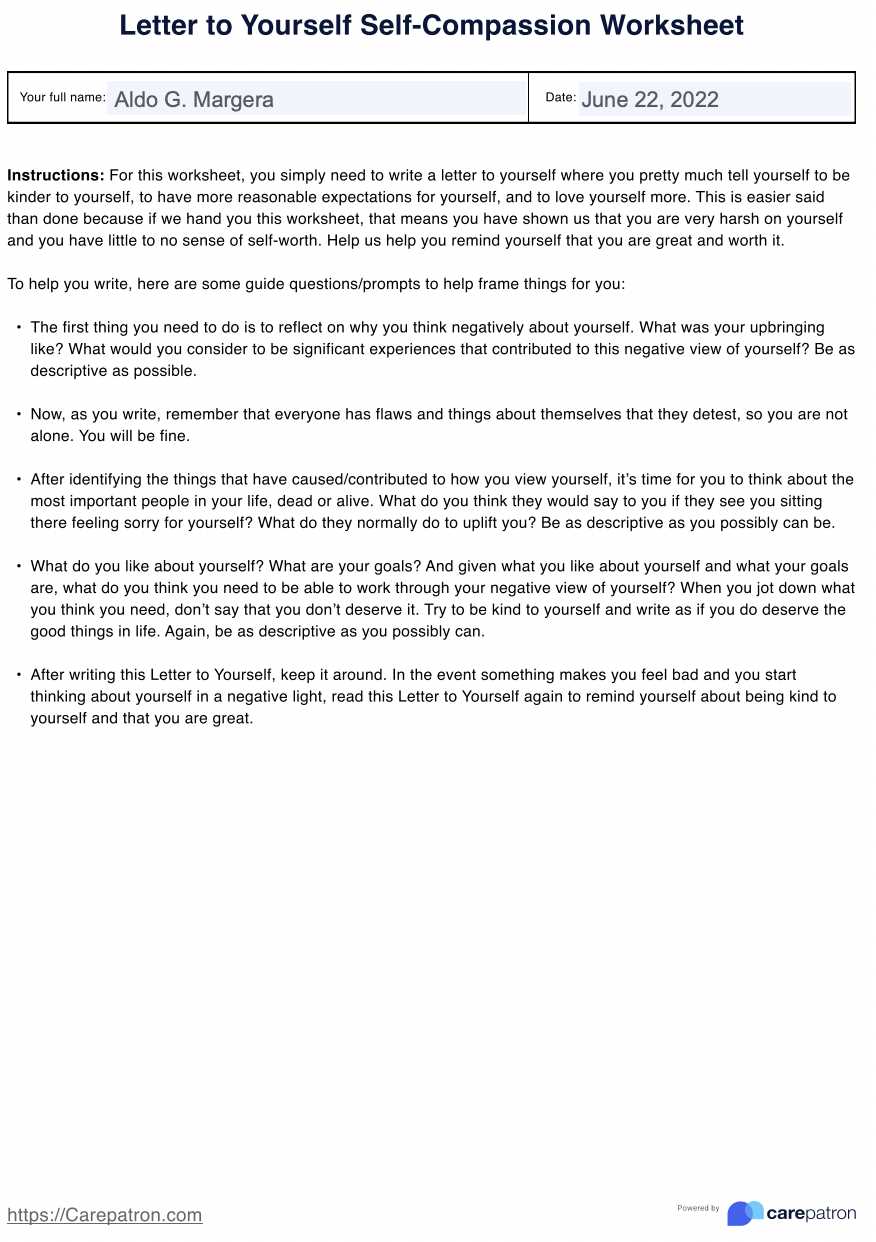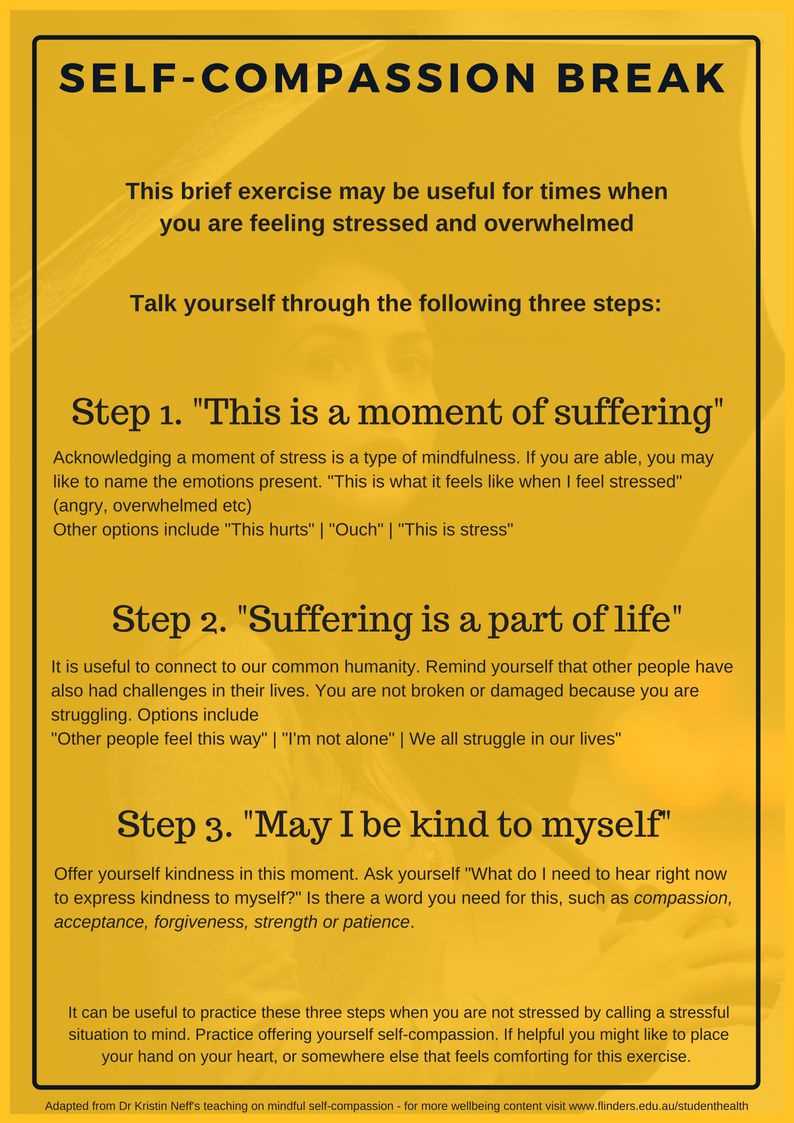Self Compassion Letter Template for Personal Healing

Sometimes, in the rush of daily life, we forget to be kind to ourselves. Yet, embracing a nurturing mindset can transform the way we approach challenges and growth. A simple yet powerful way to cultivate this mindset is through written reflection, where one can express understanding and encouragement during difficult moments.
Writing with empathy allows you to address your own struggles with warmth, offering reassurance and positive reinforcement. By organizing your thoughts in a meaningful way, you can create a space for healing and self-acceptance. This method can act as a valuable tool to reconnect with your inner strength and progress on your journey toward emotional well-being.
In this article, we will explore how putting your feelings into words can lead to a healthier mindset, while providing guidance on crafting a thoughtful message to yourself. Discover how to harness this simple practice to foster resilience, self-acceptance, and emotional growth.
Understanding the Power of Self Compassion
At times, we can be our harshest critics, focusing on flaws and mistakes rather than recognizing our strengths and potential. Developing a mindset that encourages understanding and kindness, especially in moments of difficulty, plays a pivotal role in emotional well-being. It is essential to cultivate an approach that supports personal growth, helping to build resilience against life’s challenges.
The Role of Kindness in Personal Growth

Kindness toward oneself is not about excusing mistakes, but rather about accepting imperfections with a sense of patience and care. This approach helps in overcoming obstacles and fosters a more balanced perspective, reducing self-judgment. By embracing understanding, one can create a foundation for emotional stability, making it easier to face life’s adversities with confidence.
The Impact of Positive Reinforcement
When we acknowledge our efforts with encouragement, we reinforce a mindset that values progress rather than perfection. This shift can drastically improve mental clarity and emotional resilience. Emphasizing the importance of supportive self-talk and reflection, this practice fosters a healthier internal dialogue, ultimately leading to a more compassionate and fulfilling life journey.
How to Write a Compassionate Letter
Writing a message to yourself can be an incredibly healing process, allowing you to express care and understanding during tough times. Crafting a note that offers support and encouragement can help nurture a sense of inner peace. Here are some steps to guide you through creating a thoughtful and uplifting message:
- Start with kindness: Begin by acknowledging the difficulty of the situation without judgment. Recognize that it’s okay to feel vulnerable and remind yourself that everyone faces challenges.
- Express understanding: Convey empathy toward your own struggles. Use gentle language to express that it’s normal to experience setbacks and that growth often comes with time and patience.
- Offer reassurance: Encourage yourself by focusing on your strengths and past successes. Remind yourself of your resilience and ability to navigate tough circumstances.
- Include words of comfort: Incorporate phrases that help soothe and calm your mind, such as “You are doing your best” or “You are worthy of love and care.”
- End with support: Conclude the message by reaffirming your ability to overcome challenges, and express hope for the future. Reassure yourself that you are not alone in your journey.
By following these simple steps, you can create a meaningful and healing message that fosters understanding and growth. This process can be repeated as often as needed, helping to build a habit of nurturing self-reflection and emotional wellness.
Key Benefits of Self Compassion Letters
Writing a personal message of understanding and encouragement can provide numerous emotional and psychological benefits. By expressing kindness to yourself, you can create a stronger sense of emotional resilience and a more balanced mindset. Here are some key advantages of engaging in this practice:
- Enhanced Emotional Resilience: Writing a supportive message helps to build emotional strength, enabling you to face challenges with greater confidence and optimism.
- Reduced Self-Judgment: By acknowledging your flaws and mistakes with understanding, you can lessen the tendency to be overly critical of yourself, fostering a healthier inner dialogue.
- Improved Mental Clarity: Reflecting on your experiences in a nurturing way allows you to gain perspective, reducing mental clutter and fostering a clearer sense of purpose.
- Increased Self-Worth: Offering words of encouragement can help reinforce your inherent value, leading to a greater sense of self-acceptance and respect.
- Strengthened Emotional Connection: By nurturing yourself through written words, you create a deeper emotional bond, reinforcing your ability to be your own support system in times of need.
Incorporating this practice into your routine can promote lasting emotional well-being, helping you to cope more effectively with life’s challenges and fostering a more compassionate and balanced mindset.
Practical Tips for Effective Writing

Crafting a meaningful message to yourself requires more than just putting words on paper. The goal is to create something that fosters healing, understanding, and emotional growth. To make your writing more impactful, consider these practical suggestions:
- Use gentle and encouraging language: Avoid harsh or critical words. Instead, choose phrases that are comforting and affirming, acknowledging your struggles with care and patience.
- Be honest yet kind: While it’s important to express your true feelings, make sure to do so with a sense of compassion. Share your experiences openly but in a way that encourages growth, not guilt.
- Write in the present moment: Focus on how you’re feeling right now, rather than getting caught up in past mistakes or future worries. This helps to ground the writing process and makes it more relevant to your current emotional state.
- Focus on progress, not perfection: Acknowledge how far you’ve come, no matter how small the steps. Celebrate your efforts and remind yourself that progress is what matters most, not achieving perfection.
- Make it personal: Use your own voice and style. This isn’t about following a template but rather expressing yourself in a way that feels authentic and meaningful to you.
By applying these tips, you can create a powerful tool that supports emotional growth and resilience. Writing with intention and care helps transform a simple act into a valuable practice for nurturing your inner strength.
Common Challenges and How to Overcome Them
Writing a supportive message to yourself can be a deeply beneficial practice, but it’s not always easy. You may encounter several obstacles along the way, such as self-doubt, resistance, or difficulty expressing vulnerability. Recognizing these challenges and finding ways to address them is key to making this practice truly transformative. Here are some common hurdles and how to overcome them:
- Self-Doubt: It’s natural to question whether you deserve kind words or feel uncertain about how to express your feelings. To overcome this, focus on the idea that everyone deserves support, and remind yourself that this practice is meant to help you grow and heal, not to judge or criticize.
- Resistance to Vulnerability: Opening up to yourself can feel uncomfortable, especially if you are not used to being kind or gentle with your emotions. To ease into this, start small by acknowledging one area where you feel challenged and gently explore how you might offer comfort without judgment.
- Difficulty Finding the Right Words: Sometimes, it can be hard to know how to phrase your thoughts in a way that feels genuine. If this happens, don’t worry about perfection. Focus on writing from the heart, using simple words that truly reflect your feelings. Remember, there’s no right or wrong way to express care.
- Fear of Repeating Negative Patterns: If you’ve been used to negative self-talk, it can feel like a difficult habit to break. To counteract this, consciously shift your language towards positivity and encouragement. When you catch yourself being critical, pause and reframe your thoughts in a more compassionate way.
By being aware of these challenges and adopting strategies to address them, you can make the process of writing a supportive message to yourself a meaningful and healing experience. Each time you engage in this practice, it becomes easier and more effective in fostering emotional well-being.
Integrating Compassion into Daily Life

Incorporating kindness and understanding into your everyday routine can have a profound impact on your emotional well-being. It’s not just about occasional reflective writing, but about creating a mindset that prioritizes care and empathy throughout the day. Here are some practical ways to bring nurturing thoughts into your daily life:
Start with Simple Acts of Kindness
Incorporating small, thoughtful actions can gradually shift your mindset. Whether it’s taking a moment to acknowledge your feelings, practicing deep breathing when stressed, or simply offering yourself a few words of encouragement, these small gestures help reinforce a caring attitude.
Be Mindful of Your Inner Dialogue
What you say to yourself on a daily basis shapes how you view the world and yourself. Pay attention to moments of self-criticism, and try replacing those thoughts with affirming, supportive statements. This practice will help create a more compassionate and positive internal environment.
By integrating these habits into your life, you cultivate an ongoing sense of care and support, which fosters emotional resilience and enhances your ability to cope with daily challenges.